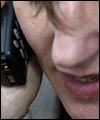| Reported / Indirect speech |
 |
||||||
|
Richard
Kang from Singapore asks: Serdar
frmo Turkey asks: Rasanka
Saroshini Nissanka from Sri Lanka asks:
|
| Roger replies: | ||
|
Reported statements The general rule is that when the reporting verb (e.g. 'she said (that)', 'they told me (that)', 'we thought (that)', 'he informed me that', 'I wondered whether', 'he wanted to know (if)' is in the past, we usually convert the verb form in the direct speech sentence into one which is more 'past' in reported speech. Hence: present
simple > past simple;
|
||||
|
Consider the following examples
But
you are correct, Richard and Serdar. If we are reporting a fact
or something that is still true, the direct speech form can often
be retained. So in your example, Richard, if the person you are
talking about is still teaching then both these sentences are correct.
|
|||||||||
|
Notes
1: Sometimes, whether you use one or the other depends upon
how you see it. Take the two reporting statements:
In the first, it might be the case that what she said was not true, whilst in the second, it clearly is the case that you believe what she says.
2: The past perfect does not change in reported speech as there
is no verb form further 'back in time':
|
||||
|
Reported questions I can't explain all aspects of reported speech in this one reply, Rasanka, but I would like to spend just a couple of minutes discussing reported questions, as I find that my own students often have greatest difficulty in coping with this aspect. For reported questions you also need to remember the need to move the verb form 双ne tense back? But, additionally, you need to remember that there is no inversion of subject and verb and no 'do', 'does' or 'did' in reported questions. Consider the following:
|
|||||||||